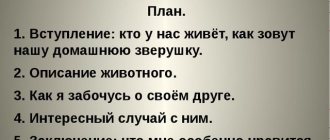“The Tale of Igor’s Campaign” is one of the most ancient works of not only Russian, but also world literature. At the same time, it has a mysterious and interesting history: written about 800 years ago, the “Word” was forgotten and was found completely by accident in the 18th century. Many scientists are studying this greatest of masterpieces, but have not yet been able to fully unravel it. It is obvious that the work is deeply patriotic and carries an appeal to all future generations, a call to preserve the integrity of the homeland, to protect it from enemies.
“The Tale of Igor’s Campaign” essay, 9th grade
Option 1
There are books that, once you pick them up, you want to re-read more than once. They attract the reader, taking them into the distant past and pointing the way to the future.
One of these masterpieces is “The Tale of Igor’s Campaign.” Created in 1185, it still amazes with its relevance and wisdom. And it is no coincidence that this creation, deeply rooted in the culture of the people, is considered a monument of ancient Russian literature. As is known, fiction was unacceptable for works of this genre. It has an exclusively historical character. The description of real historical events is the basis of the works of ancient Russian literature.
Just by the title you can determine the theme of “Words...”. The reason for its writing was the campaign of Prince Igor Svyatoslavich against the Polovtsians. This campaign turned out to be unsuccessful: Igor’s squad was defeated, and the Seversky prince himself was captured.
The small army of the brave but reckless prince was supported by his brother Vsevolod, son Vladimir and nephew Svyatoslav Olgovich. However, the quantitative superiority of the Polovtsians predetermined the outcome of the battle. This defeat had tragic consequences not only for the campaign participants, but also for the entire Russian people. Inspired by the victory, the Polovtsians increasingly began to invade the Russian land.
The image of nature in the work is very touching. She is a full-fledged hero. Nature in the “Word...” warns, forbids, helps, cries, predicts...
Before the march, a dark shadow falls on the Russian regiments. But the solar eclipse does not stop Igor. He ignored the warning of the sun, which blocked his path with pitch darkness. Igor is not afraid of the thunderstorm either. All nature rebelled against the advance of Russian troops. Birds and animals are worried about the warriors.
Igor’s wife Yaroslavna has a completely different attitude towards the forces of nature. It is to them that she turns for help, calling for the salvation of her husband and his squad.
And nature stirred up again. The sea leapt up, a whirlwind rushed towards his native north... The Lord himself shows Igor the way home. Nature rejoices at the return of the brave prince.
However, the consequences of the campaign are disastrous for the Russian land, which was fragmented into many principalities. Constant civil strife weakened Rus' from within. The princes sought to strengthen and expand their territories, forgetting about the main threat that came from outside.
The awareness of this simple truth gives birth in the soul of the great Svyatoslav to the thoughts expressed in his “golden word”. With pain, he asks where the valiant Russian princes and their servants are. He remembers the times when they went to defend the Russian land with knives and without shields. With tears, Svyatoslav calls on the Russian princes to unite. Only together can we protect our homeland from the increasing frequency of enemy raids.
And it is no coincidence that Svyatoslav’s “golden word” turns into the author’s monologue. This technique indicates that the prince’s thoughts are shared by the author of “The Tale of Igor’s Campaign.”
The work is still relevant today. It is designed to protect the Russian people from a wrong historical step. Today, when they are trying to blow up Russia from within, it is necessary to remember the sad lessons of history.
Option 2
The work “The Tale of Igor’s Campaign” is a rather valuable and unique work that not only reflects some important historical moments, but also details the life, spirituality and culture of that time. The time period of this story can be considered the end of the twelfth century, and the location is Kievan Rus. It can also be emphasized that the work “The Tale of Igor’s Campaign” is not only valuable for the people living in the places of the story, but also for the whole world.
The whole story is written exclusively in Old Church Slavonic, which was later translated into modern language. The main points of the work “The Tale of Igor’s Campaign” is the confrontation between the Russian people and their enemies, who continually tried to gain power and advantage over them.
The plot touches on the reasons and details of the military campaign of the northern prince, Igor Svyatoslavich, which was carried out with the aim of liberating the Don waterway from the Polovtsians who had captured it. And thereby protect the Russian people from the constant, devastating adventures of nomadic tribes.
The plot involves two brothers, Igor and Vsevolod, sons of the great and invincible prince of Kievan Rus, Svyatoslav. The brothers decide to repeat the feat of their father and win victory over the Polovtsians. They fight bravely, not sparing themselves, since the whole of Rus' and the entire Russian people stand behind them. But despite all their valiant courage, the brothers face defeat.
Which their father had foreseen. He even foresaw the sad outcome of this battle. Afterwards, Svyatoslav pronounces his “golden” word, which contained a reproach and some disappointment for the Seversky princes, for their haste and incorrect calculation, a laudatory response for their courage and courage, as well as censure of the rest of the princes. By this he tried to call for the unification of the forces of the entire Russian people against the enemy. This, he said, will protect and secure the entire people from barbarians and their atrocities.
Option 3
“The Tale of Igor’s Campaign” is considered to be a monument of ancient Russian literature. It is not without reason that the work received such a high title, because the role of this epic poem is not only to describe historical events, but also to reflect Russian culture.
The narrative touches on the events of the end of the 12th century, namely the campaign of the Novgorod-Seversk prince Igor Svyatoslavich against the Polovtsians. And this historical heritage is characterized by one distinctive feature: despite the fact that the epic, as a rule, glorifies the exploits of heroes and their great deeds, in “The Tale of Igor’s Campaign” we are talking about a military campaign with an unsuccessful outcome.
And even if not all battles end in success and triumph, military affairs have always played an important role for the Russian people. In the Middle Ages and antiquity, Russians were repeatedly attacked by invading tribes, and then, of course, they had to fight for freedom, for their homeland, for the protection of their wives and children. By the way, the importance of the image of a wife waiting for her warrior husband at home is also reflected in the poem. Yaroslavna's cry embodies the grief of all mothers and wives who yearn for the soldiers who have gone to the battlefield.
In addition to historical data, the poem also includes a fairly significant cultural component. The most obvious cultural element is omens. In ancient Rus' there were such phenomena that were considered signs from above (for example, a solar eclipse). It was customary to treat them with due care and follow them, but the main character of the poem ignored the sign and subsequently failed.
Thus, “The Tale of Igor’s Campaign” is not only a description of a historical event, but also worthy material for studying the cultural characteristics of the ancient Russian people, which rightfully allows us to call the poem a monument of literature.
The main characters and their characteristics
All the main characters of the poem are positive characters. There is only one negative image - the enemy force of the Polovtsian nomads. However, this does not mean that the description of the characters will be monotonous, as in a play of the classic era. In this case, it will pamper the reader with contrasts and ambiguous qualities.
- Igor is a brave, resourceful, but vain and short-sighted ruler, the main character of the work. He is complacent and young, so he does not yet know the true purpose of a leader. The author managed to show the moment when the prince grew up: he went on a campaign with youthful enthusiasm, and returned with a heavy burden of experience. In the finale we see a different character - his mind has become clearer, and his character has gotten rid of pride. You can find more detailed information in the essay: Characteristics of Prince Igor .
- Svyatoslav is the wise and fair ruler of Kiev. He wholeheartedly supports the unity of the Russian lands and wants to achieve the prosperity of his people. The prince reproaches Igor’s recklessness and ardor, without defending him for his relationship. He recognizes his brother’s shortcomings and, nevertheless, wants to help him, because civil strife in Rus' is weakening it, and the external enemy will only be glad to take advantage of this. This position, where the good of the state is above all, characterizes him as an active, talented and dedicated person who also feels personal responsibility for everything that happens even outside his territory. He is a reflection of the author’s ideal idea of a crowned prince.
- Yaroslavna is a bright and original female character, the main character of “The Tale of Igor’s Campaign.” This woman doesn’t even have her own name, because back then ladies were called by their patronymics in order to emphasize their origin, the measure of nobility of which was the head of the clan - the father. The girl herself was in a subordinate position, no one attached much importance to her, because in those centuries everything was decided by physical strength, and the weaker sex was deprived of it from birth. However, the author breaks stereotypes and portrays a full-fledged female character, and even devotes an entire chapter to it. Igor’s wife is a strong, devoted and emotional wife, the standard of a faithful and loving life partner. Her husband’s defeat did not bother her; she decided to act in the only way possible for her: to soften the gods with prayer. Thanks to her temperament and sincerity of crying, she manages to enlist the support of the elements and help the prince get out of captivity. Her image is described in more detail in the essay: Characteristics of Yaroslavna .
- Boyan is a court singer and poet who praises those in power and their military exploits. For the beauty of his lines and his patriotism, he is loved not only by princes, but also by the people. The hero enlightens him with his song - a story to the accompaniment of the gusli.
- The description of the characters cannot be considered complete without the image of the author of the work , which can be seen quite clearly. He is a great patriot and passionately loves his homeland. This is shown by the example of the description of nature, the author’s sympathy for the heroes and his undoubted faith in the bright future of Rus'. The author’s broad historical outlook, his education and writing talent are striking, because Yaroslavna’s crying, for example, is not a historical event, but plays an important role in the book in creating the artistry of the text and developing the mystical theme. It was Igor’s wife who was able to command the elements and help her husband, and not the troops of his brothers. Therefore, in this case, the chronicler is not a historian, but a writer.
Minor characters in the story are found in each chapter: this is Prince Vsevolod the Great Nest (Igor’s brother, who also went on a campaign), the Polovtsian Ovlur (the one who rescued the prince from captivity), Kzak, Konchak (two Polovtsians who pursued the escaped prisoner), vigilantes, etc. The characters are described in more detail in our essay “ The System of Images in the Tale of Igor’s Campaign .”
Essay-discussion on the topic “Prince Igor”
“The Tale of Igor’s Campaign” is a pearl of ancient Russian literature, as many researchers rightly note. This work has absorbed all the flavor of the rich folk culture of ancient Rus'. The lyrical and epic principles in the work are intertwined into a single picture, where the author highly artistically described a historical event - the campaign of Prince Igor against the Polovtsians. Since Igor from the Rurik family is a real historical figure, it is especially interesting to observe how the author embodied this image, what qualities he endowed him with.
The image of Igor is a kind of model of a medieval ruler, endowed with all the characteristics of the era. He is militant, brave to the point of recklessness, but, it would seem, not a far-sighted politician. He is bursting with a sense of his own superiority, he is too self-confident, so he goes on a dangerous and risky hike. Instead of uniting with all his relatives and striking a powerful blow, he goes to gain easy glory. This means that Igor is vain. This is probably because he is still very young and hot-tempered, and a mature man, wise with experience, should rule. Igor, on the other hand, cares more about his fame and is ready to lay down his head for the sake of prestige.
The question is, why was this reckless feat needed? Is the monarch really so limited? I think Igor is not stupid after all. He is tormented by an inferiority complex. He ascended to the throne early, he still needs to prove to his squad and family that he can rule. The opinion of the squad was more important, since in the Middle Ages all issues were decided by force. If the warriors turn away from the prince, he will not be able to remain on the throne. Authority among warriors can only be acquired in war. At the same time, it will be clear to the family that Igor is not a fool, that if something happens, he can cope with other principalities.
Many researchers call the Middle Ages dark times because intelligence, the ability to compromise and ideas of equality that are valued today were not valued then. Therefore, one cannot demand that Igor have these qualities and thoughts. He ruled as best he could, as was customary then. Many are outraged that Igor left Yaroslavna without much sympathy and preferred exploits to family happiness. But I think we don't understand that mentality today, so a trial is inappropriate. The relationship between the prince and princess should be perceived as a curious picture of the morals of that time: the wife had to show off her emotions (crying is a type of folklore genre of that time), and the husband, on the contrary, had to prove himself on the battlefield. A woman in those days was not an independent literary image at all: she didn’t even have a name, she was called by her patronymic. A man, as the personification of brute force, in the Middle Ages, on the contrary, had great significance. Everything depended on him, because if a man allowed himself to be weak, women would be driven into slavery, and children and old people would be killed by other tribes.
Historically, Prince Igor (and he was no exception) regularly went with his army to collect tribute. This is another reason to earn authority through blood. If there is no tribute, the tribes will disobey, and there will be no money to maintain the army. This means that the principality will not be able to defend itself and will fall apart. Therefore, Igor is not as simple as he seems. His actions are guided by calculations characteristic of the medieval mentality.
In the finale of “The Tale of Igor’s Campaign,” the hero gains tremendous life experience: he escaped from captivity, barely escaped death, and killed his warriors. Only then does the calculating, but still too ardent prince understand how important unification is for Rus'. He realizes that you can’t pull the blanket on yourself, you need to take care of all of Rus', if you own it. This important discovery ennobles the hero and makes him wiser.
Thus, the author depicted the evolution of the hero, his maturation. We see how, using the example of the prince, he shows the need to unite Rus' and the Rurik family, because internecine wars create a vulnerability that is exploited by external enemies. Igor learns through bitter experience and becomes a capable ruler, and the historical background at our disposal confirms that the prototype hero evolved in the same way.
Subject
The folk epic is distinguished by the fact that its themes do not depend on the country in which it was created. Most accounts of deep antiquity raise the same issues with minimal differences.
- In “The Tale of Igor’s Campaign” the main theme is patriotism . All the author’s efforts are aimed at instilling in the reader an active love for the fatherland. Svyatoslav’s “Golden Word” especially stands out, where the hero calls on the princes to unite the lands and live in one spirit in order to protect themselves from enemies.
- The theme of nature is also one of the main themes touched upon in the work. She echoes the actions and feelings of the heroes, and also plays an important role herself, helping the Russian army or turning away from it. You may also find the essay interesting: The meaning of nature in the Tale of Igor's Campaign .
- The homeland in the poem is not only an image, but also the main theme. Rus' is depicted in the book as a set of related forces and phenomena, interconnected by love for its people. It is not for nothing that Yaroslavna turns to the elements: she knows that her native land will help out its ruler, as she once warned him against going on a campaign. The female image is a continuation of the theme of the homeland, because Igor’s wife is the personification of his principality, which without him will become a widow and die. The princess’s crying is accompanied by the lamentations of her fatherland, the Motherland, which aches in her soul for her defender.
- Love and fidelity are the embodiment of the lyrical side of the work. The wife faithfully waits for her beloved, begs nature to intercede for him, sparing no effort. She sincerely worries about the fate of the prince and does not hold grudges for his departure, meekly and patiently enduring the difficult lot of women.
- Heroism and courage are embodied in the image of the main character. He bravely goes on the attack, like his entire squad. They were defeated by cunning and deceit, but not in a fair battle, where everyone fought bravely, defending the honor of their homeland. In the duel with the Polovtsians, the theme of honor and dishonor is also revealed: some go ahead, according to all the rules of the duel, others treacherously attack under the cover of darkness, dooming themselves to a shameful victory.
- Experience and mistakes. Svyatoslav acts as an experienced commander and leader, teaching his proud and vain cousin, who made a mistake, because he was very young and ardent.
Issues
“The Tale of Igor’s Campaign” is not a praise of victory, but a true story of defeat with the purpose of teaching. The main problems in the book concern precisely the reasons for the defeat of Rus', and the conclusions are generalized and explain not only the position of the main character, but also all the troubles that are a consequence of feudal fragmentation.
- The problem of disunity . The princes not only do not help each other, but also fight with each other in attempts to redistribute lands or spheres of influence. This vulnerability is skillfully exploited by external enemies who raid weakened fortresses. As a result, all Russian rulers and their subjects only suffer from the fragmentation of a state with a single culture, the same language and the same customs. The centralization of power, which Svyatoslav calls for, is the only way out of this situation.
- The problem of vanity . Igor sacrificed people's lives for the sake of personal glory, without thinking about the consequences of his actions. He feasted frivolously, forgetting about the hidden threat on foreign soil, so the death of many glorious warriors was on his conscience. In an attempt to gain respect, he forgot about his primary duty - to take care of the prosperity of the people entrusted to him.
- The problem of pride . The main character was overcome by this vice, which instilled in him a furious conceit. It is this that prevents Igor from asking for help from Kyiv and going against the Polovtsians with a guarantee of victory. However, the ruler wanted to appropriate the laurels of the winner, especially since he was confident that he could handle the matter, forgetting about elementary caution.
- Clash of mentalities
. The Russians were not prepared for meanness on the part of the Polovtsians; they thought that the rules of battle were the same for all nations and peoples. However, deceit and cold calculation prevailed over courage and strength; the squad did not predict this.






